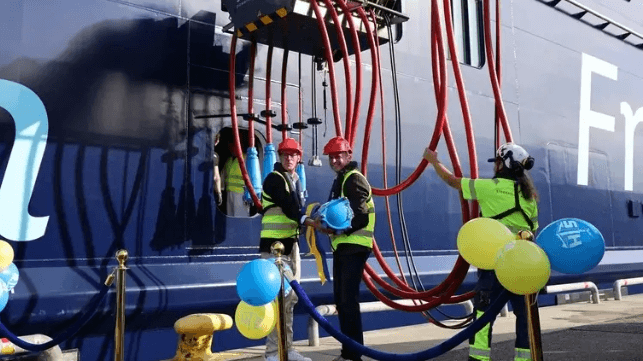Ports of Stockholm has joined a growing number of European seaports investing in shore power to cut emissions from cruise ships at berth. The port has now inaugurated Sweden’s first facility for onshore power supply (cold ironing) for cruise ships, and TUI Cruises´ brand new vessel Mein Schiff 7 is the first vessel to plug-in. Built at the Meyer Turku yard in Finland and designed for operation on methanol, the 315-meter, 2,900-passenger ship was delivered in June this year.
Stockholm embarked on the project to install two onshore power facilities for cruise ships at Stadsgården quays two years ago with grant funding from the European Union and the Swedish Environmental Protection Agency’s Klimatklivet initiative.
The facilities are designed to reduce carbon dioxide emissions from cruise ships in port and reduce noise from the engines, since ships at berth can now connect to grid electricity and to turn off diesel generators.
The inauguration of shore power comes as Stockholm is nearing the end of yet another busy cruise season in which a total of 121 ships were scheduled to call at the port. In 2023, 128 cruise ships called at Stockholm, bringing a total of 482,000 passengers to the destination.
The shore power facility allows at least 45 percent of cruise calls at Stockholm to connect to electricity, which is 100 percent green and comes from renewable sources such as wind and hydro power.
“The inauguration of Sweden’s first onshore power connection for cruise ships is an important milestone in creating a premium destination for sustainable cruise traffic, both in Stockholm and throughout the Baltic Sea region,” said Jens Holm, Chair of the Board of the Ports of Stockholm.
The shore power adds to Stockholm’s green credentials. The port has long offered reception facilities for black and grey water from ships, and 85 percent of all cruises calls at the port use these facilities.
Most cruise vessels have their own sewage treatment plants on board and can also store wastewater in their tanks for longer periods. Ships are obliged to leave solid waste in port, and source-separated waste is subject to reduced waste disposal fees.
Stockholm is part of the Cruise Baltics network, which aims at making the Baltic Sea the most sustainable destination. At least 19 leading cruise shipping companies have signed a memorandum of understanding where they commit to use the onshore power connection facilities that are available.
Three other Baltic seaports – Copenhagen/Malmö and Aarhus in Denmark and Helsinki in Finland – have also benefited from the EU grant to invest in shore power facilities.
Reference: https://maritime-executive.com/article/ports-of-stockholm-joins-rush-to-add-shore-power

